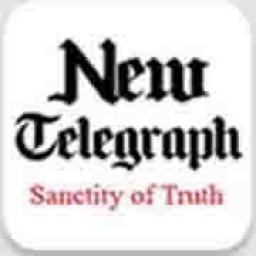…ILD is a clarion call to action on deepening efforts to improve literacy
SENSITISATION Following the low literacy level in the country, stakeholders have expressed the need for parents to speak their mother tongues to children at home, while efforts should be put in place by the government and schools to teach the students in nation’s indigenous languages
- Nigeria could only boast of 62% literacy level – National Library
- As parents, we’ve disappointed our children – ZODML
As Nigeria joined the rest of the world to commemorate this years’ International Literacy Day (IDL), concerns have been raised by critical stakeholders over the nation’s low literacy level.
According to 2028 UNESCO report, Nigeria has 62 per cent literacy level, suggesting that Nigeria, the most populous country in Africa, has a huge figure of illiterate population, a development which to stakeholders is not acceptable and should be tackled headlong if the nation is to break away from its shackles of high level of illiteracy.
This is also as they called for action on the part of the government, parents, schools, non-governmental organisations and other stakeholders to rise up to the challenges and address the low literacy level in the country with all energies it deserved.
The World International Literacy Day was instituted by the United Nations Educational Scientific and Cultural Organisation (UNESCO) specifically for people worldwide to celebrate International Literacy Day (ILD), create awareness and to remind the international community individuals, local communities, and societies about the importance of literacy for the people.
International Literacy Day, which is being celebrated yearly on 8 September, was declared by the United Nations Educational Scientific and Cultural Organisation (UNESCO) on October 26, 1966 at the 14th Session of UNESCO’s General Conference.
This International Literacy Day is set aside in transforming lives through literacy and to empower individuals to overcome the barriers of illiteracy and open doors to new opportunities. The theme of this year’s celebration is “Promoting Multilingual Education: Literacy for Mutual Understanding and Peace.”
According to UNESCO, International Literacy Day is a day dedicated to promoting the importance of literacy, reading and writing, while the International Literacy Day 2024 is basically about how to drive literacy programmes to reduce inequality, improve education, and foster social resilience.
Objectives
The objectives of this year’s International Literacy Day is to galvanise new approach that will unpack issues related to literacy in multilingual contexts for achieving lasting peace and will explore possible solutions for enhancing policies, lifelong learning systems, governance, programmes, and practices, as the day was celebrated in-person and online at the global, regional, national, and local levels.
Basically, the theme emphasised the pressing need to harness the transformative potential of literacy for promoting mutual understanding, social cohesion, and peace.
“In today’s world, in which multilingualism is a common practice for many, empowering people by adopting a first language-based, multilingual approach to literacy development and education is particularly effective for its cognitive, pedagogical, and socio-economic benefits,” the organisation stated.
Such an approach, according to UNESCO, can help promote mutual understanding and respect, while solidifying communal identities and collective histories. However, it also highlighted that poverty could seriously restrict children’s access to resources outside the classroom that they need to thrive, given the reality that about 773 million people worldwide are unable to read or write.
We must promote writing and reading in indigenous languages
Challenge
Faced with this reality and other contending issues slowing down literacy level in Nigeria, key stakeholders, including nongovernmental organisations, policymakers, National Library of Nigeria, teachers and school children gathered for one day at the Green Library of the National Library, Lagos, to celebrate the day and give more bite to the literacy initiative.
This year’s celebration was facilitated and organised under the auspices of Zaccheus Onumba Dibiaezue Memorial Library (ZODML), a non-profit organisation that establishes free library and online resources for self-development and donate books, in conjunction with National Library of Nigeria.
Setting the tone of the celebration, the Coordinator of ZODML, Mrs Ifeoma Esiri, described as a “calamity and problem,” that a good number of Nigerian children could not speak their mother tongue or language. Lamenting this scenario, Mrs Esiri, who said “as parents, we have disappointed our children,” stated further that the day is to promote multilingual education and literacy for mutual understanding and global unity.
She noted that the more the people can speak their mother language or are literate, the more tolerant they are and the more peaceful the society will be. Mrs Eziri, therefore, called for the delivery of education in a multilingual language, particularly the language of the children, saying this would give more understanding and boost interaction among the people and enhance learning outcomes.
“It is a pity that many of our children can only speak English and not their mother tongue. Language is not only about speaking, but about reading and writing,” she stressed. Against this background, she spoke of the need for the government to put in place a system where Nigerian children are taught in their mother tongues or language how to speak, read and write.
For instance, she noted that if a child is Igbo, Yoruba, Hausa, Fulani, he or she should be able to read in her mother tongue, and not only in English as we have it today, since knowing literacy is about a written language and we should be able to read, write and understand our language.
“The purpose is to encourage the government and students to read and write and to make them understand. Literacy is more than reading, but a conscious effort for readers to understand the environment, heritage, and their community,” Mrs Esiri said.
However, the National Librarian/ Chief Executive Officer of National Library of Nigeria, Prof Chinwe Veronica Anunobi, who noted that literacy, is cultural aspect of reading and writing, added that the day is being celebrated yearly to remind the government, communities, society and individuals the need for the people to learn how to read and write.
According to her, literacy day is a fundamental right and awareness to create a sustainable, understanding and peaceful society. “The level of literacy of a people is measured based on the number of the people who can read and write their indigenous language of communication,” she added.
Therefore, Anunobi, who regretted that based on the 2018 UNESCO report that Nigeria could only boast of only 62 per cent literacy level, when a country such as Ireland has attained 95 per cent literacy level, stated that literacy requires conscientious efforts especially where other intervening variables hinder this capacity.
The National Librarian, however, added that the main aim of the day is to remind policymakers, individuals, communities and societies the critical role of literacy as a fundamental human right and as a tool for creating a more just, peaceful and sustainable society. Consequently, Anunobi said this year’s celebration is a clarion call to action for the government to strengthen and deepen efforts and concerns to boost literacy, which she noted, is a ladder to all human potential and possibilities.
“No country and individual can realise developmental potentials without a literate mind(s),” she stated, stressing that literacy is tied to every sustainable development goal index, and hence the call on policymakers to take action and position policy that will engender literacy for lifelong learning and development.
Towards this call to action, she insisted that individuals should not give deaf ears to this valuable call, while communities to strategise towards enhancing the literacy skills in the communities and ultimately Nigerian government not to leave the governed in the dark.
Given the theme of this year’s International Literacy Day, Prof Chinwe in her keynote address, Anunobi, recalled that man is a social being with capacity to interact within and outside his territory and considering that every community has a means of coding and decoding, which is distinct from other communities.
Describing the theme as apt, she explained that literacy would not be restricted to only the Lingua franca like English language in Nigeria, since the ability to read and write in multiple languages is more than just a skill, but as a bridge to understanding and collaboration across cultures, and which also deepens indigenous technology development and adoption.
Initiative
Speaking on the initiative to promote literacy, the National Librarian, recalled that Nigeria has since 2021 keyed into the initiative to promote multilingual education when a policy was put in place by the Ministry of Education for all basic schools to teach in the language of the immediate community.
But, to her, it is worrisome that the Nigerian populace is very low in literacy for both English and indigenous languages, and therefore called for the review of the country’s stand either to continue to rank low in this important development index or take a drastic step to avert it.
While she called on the government to rise up and not to make illiterate community of the rule, lauded ZODML, which National Library is partnering, for its drive in promoting and deepening reading habit among the Nigerian populace, Prof Anunobi called on all stakeholders to ensure that literacy is enhanced.
Specifically, she explained that UNESCO has picked 2022-2032 as International Decade of Literacy for all communities to promote their indigenous languages, saying in line with this the government and policymakers should up its games in strengthening literacy because the country needs literate minds to actualize a sustainable development.
Based on this, she noted that several initiative had been strengthened through partnership such as the Green Library, a space that encourages reading and promoting SDG goal nos: 4, 13 &17; quality education, climate action and partnerships for goals; as well as the Network of Book Clubs and Reading Promoters (NBRP) established to support reading clubs all over the country.
Anunobi said: “For us in the National Library we will not rest on oars within our capacity to promote literacy and in collaboration with stakeholders of like minds towards achieving this key mandate of enhancing reading and literacy.
“Therefore, today we are celebrating one of the partnership efforts – the green library – space that encourages reading and is promoting SDG goal nos: 4, 13 &17; quality education, climate action and partnerships for goals, respectively. We are centrally engaging with the Network of Book Clubs and Reading Promoters (NBRP) to establish and support reading clubs all over the country.”
Besides, the Chief Executive Officer added that the National Library has also made moves to eschew the dichotomy prevalent in literacy enhancement opportunities by taking its readership promotion campaigns to the hard to reach communities where it also established literacy centres – literacy and reading should be all inclusive.
As part of its conscientious efforts to improve literacy, she spoke of how the National Library has continued to advocate for schools to prioritize reading in diverse forms, especially setting time aside (reading hour) for reading.
The National Library, according to her, has continued to donate books for establishment of school libraries and to sensitize authors and publishers on the nature of literature a typical ‘Gen Zee’ loves to read. “Our 34 branches in 33 states and Abuja are windows for books and information resources lovers to immerse and make a difference in their lives.
We are not unmindful of the need to read and preserve our indigenous languages so we are advocating for that during our promotions. We must promote writing and reading in indigenous languages because Nigerians were literate before the advent of colonial masters,” she stressed.
While advocating for enhancing literacy, which is a mere rhetoric except reading is promoted, the library also advocated that reading will not yield fruit except libraries are established and equipped.
The easiest way to evolved children to electronic reading and ensure inclusivity, she explained, is deployment of electronic devices in libraries, saying that if the nation wants to achieve great minds that will move a people, it must first achieve great readers, a level of literacy that is dependent on the people’s extent of reading.
Based on this, she called on the government to incentivise Nigerians to embrace literacy by transforming libraries to engender reading, even as she also encouraged the young ones and even the old to make reading their life wire.
The National Librarian, who stressed further that literacy, does not stop with the ability to decode numerals and alphabets, but a continuous process, noted that basic literacy evolves to digital literacy, financial literacy, environmental literacy, health literacy, political literacy and all round literacy.
Way forward
To enhance literacy in Nigeria, she said the government and other education providers should find reading materials in the classroom, stressing that there is the need for more reading books and access to books, while we should sensitise them to read.
According to her, during birthdays, parents should endeavour to buy books as presents for their children rather than other materials. “All this will encourage the children to read and appreciate reading.
Schools should also provide library hours in schools, as it was the case before, where students will go and to read, study and borrow books to read at a particular lesson hour. “This is to give the children the opportunity to read and discuss.
This will enhance their literacy level as this will encourage them to read,” she added. Prof Anunobi, who spoke of plans by the National Library to flag-off the Leadership Promotion Campaign, where they will sensitise the children and students to read books and also give them books, added that Library plans to also create Small Literacy Centres in towns and villages across the federation, where children and adults can go to read and we are donating books to schools. The National Library is encouraging schools to establish libraries in schools to encourage children to read.
As part of the way forward, Prof Anunobi, who stated that the basic institution, which is the home, should be the foundation for the children to cultivate the right habit for reading, however, advised parents to give the children books to read at weekend rather than leaving them to play or watch mundane films.
However, Mrs Esiri, in her message to the government and parents, noted that going by this year’s International Literacy Day theme, they should ensure that the children will be able to read and write in his or her local languages.
Towards this end, the government, she explained should have a programme in the school system where books should be written in Nigerian language, such as in Yoruba, Igbo, Hausa and other languages so that the people will be able to read them and become literate in their own language, and learning through books.
Similarly, Mrs Esiri urged the government to encourage a crop of Nigerian authors to write books in Nigerian languages, which according to her, are common in the Northern part of the country, where the people learn in their languages.
Meanwhile, Dr Newton Jibunoh, who expressed delight at participating in the ceremony, reminded stakeholders that literacy is not just education in the four walls of the classroom, or school arrangement/environment. He advised Nigerian children to embrace and develop more interest in reading, as it will enhance their education, understanding of life, their culture and environment, as well as other people’s culture.
Jibunoh, who told the children how he drove from London – Europe to Lagos for about three months in 1966, and expressed regrets that Africans do not explore, said Africans should think out of the box and start exploring.
He also advised the children to see reading as part of their life, saying Nigerian children must not be left behind in Artificial Intelligence (AI) if they want and must compete with the rest of the world.
.png)
 3 hours ago
5
3 hours ago
5









 English (US) ·
English (US) ·